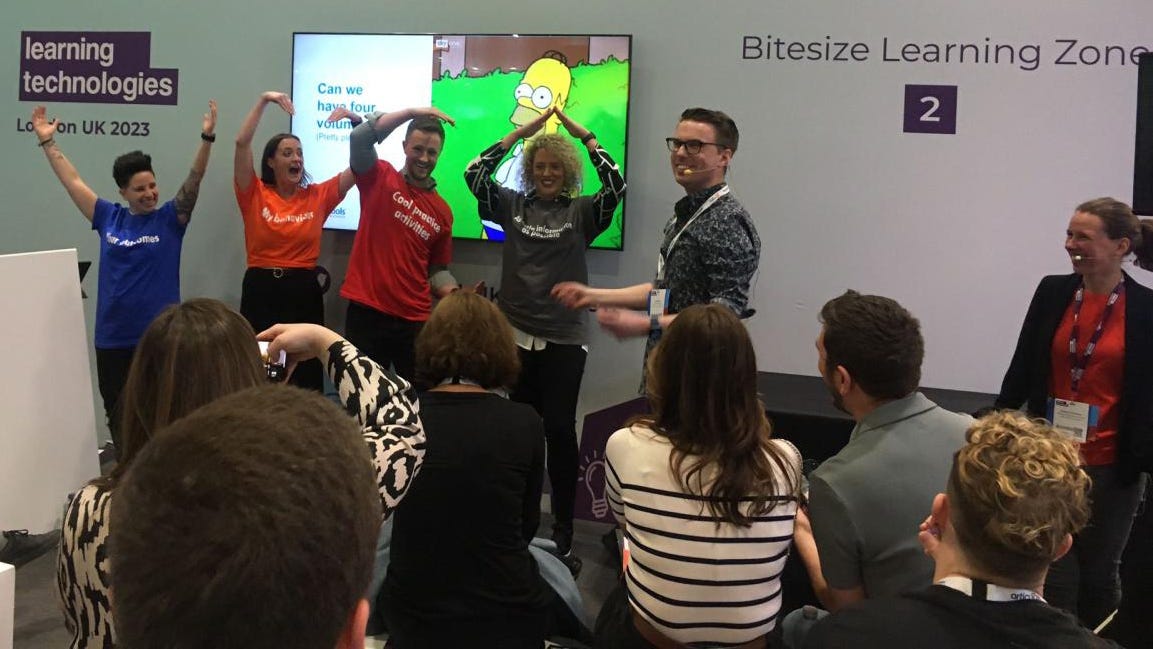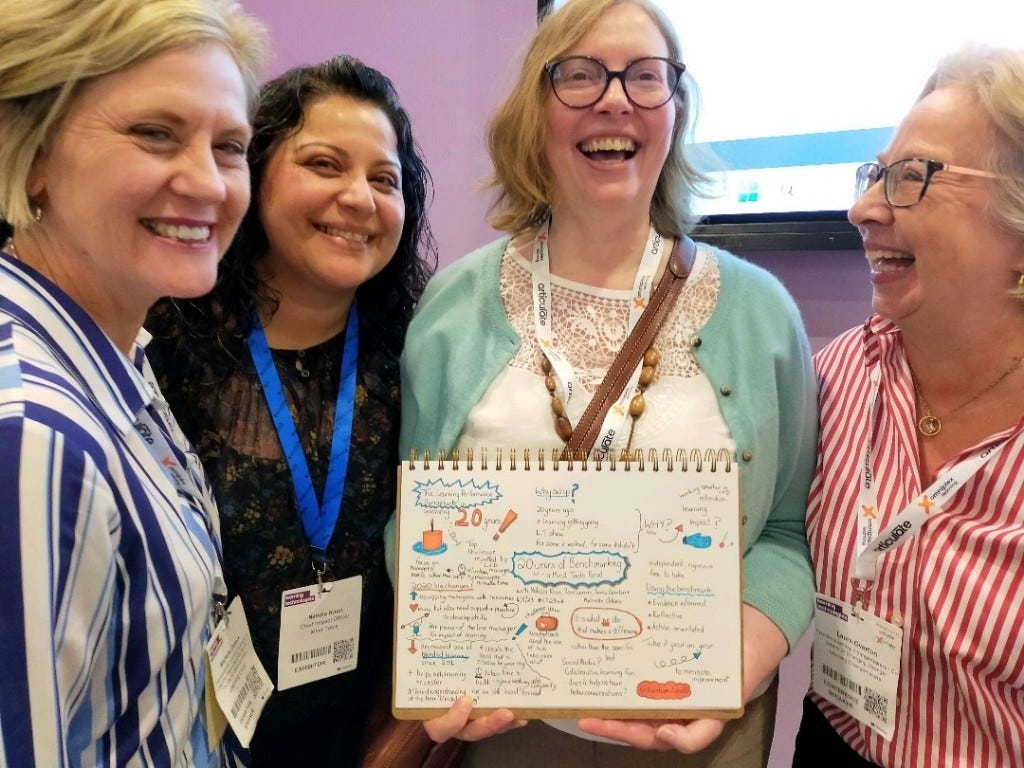The one instructional tool you couldn't avoid at Learning Technologies
We challenged ourselves to avoid lecture presentations: You answered with 26 ideas that were better than ours.
This year’s Learning Technologies Conference in London marked my 10th year working in the L&D industry, and my first conference since Covid. Each year is always a little different, as annual trends drift from ‘mobile learning’ to ‘Netflix of learning’ to ‘learning in the flow of work’.
I remember people queuing up to try on VR headsets which, this year, seemed to go rather dusty.
But there was one tool in particular that dominated this year’s event. It was present in the Conference and Exhibition, and you couldn’t move without seeing it being demonstrated.
No, not AI. The lecture!
With origins dating back to before the 14th century, the lecture remains an effective tool to control the learning environment. It’s safe for the presenter, who can stick to a script. And it’s safe for the audience, who don’t need to get involved.
But it’s not great for learning.
Donald Clark neatly summarized 10 reasons why way back in 2014.
That’s why we set ourselves a challenge this year: across the four sessions we were running as part of the Exhibition, we would not once have a presenter stand in front of a slide deck and read off a script. Instead, we wanted to find ways to involve the audience and have them become active participants in the learning experience.
It took us a while to come up with workable ideas for this, but here’s what we tried:
Voting cards - An idea stolen from the gameshow Ready, Steady, Cook, we handed out orange and blue cards and asked the audience to vote by holding them up. At one session, we used these to give the audience a chance to pick a podcast title and topic, which we then performed. At another, we used them to encourage the audience to guess the correct answers to a series of questions. Guessing is, after all, great for learning!
Audience participation - A high-stakes option that almost fell flat, until we were rescued by a brave conference attendee who volunteered to stand up in front of a crowded room and host our pretend podcast! Thanks Sophie Ward for doing that! You can see a snippet on LinkedIn.
Singing and dancing - Our original concept here was to have four volunteers from the audience stand up and put on t-shirts to represent different stages in our design process. We’d then have them dance and perform the YMCA. If this sounds too bold to work, you’re absolutely right. We opted to have ‘plants’ in the audience, and I could see the visible relief on the faces of the other attendees when they revealed themselves.

Finally, Slido polls. What I liked about these is that, when we challenged attendees to come up with practice activities that would help learners ask coaching questions, we were met with 26 great ideas - all of which I’m going to file away for when they’re needed 😉
Suggestions from attendees included:
Coaching triads - One person acts as coach, one person acts as coachee, a third acts as observer to give feedback;
Speed dating - Participants pair up for 2 minutes, practice coaching, then move on to the next person;
Flipping the questions - Participants shout out ‘bad’ or ‘closed’ questions, which the group then ‘flips’ to identify good questions;
20 questions - Participants think of a celebrity, then get asked open questions until the questioner works out who the celebrity is;
Crowdsourcing - Participants ask as many questions as they can in 60 seconds;
The fishbowl technique - Two people sit in the centre of the room. As they ask each other open questions, they get up and are replaced by other participants.
This approach wasn’t just a great way to crowdsource ideas for my own ends, but also reminded me why I love Learning Technologies so much in the first place: the people there are enthusiastic, generous and keen to share their expertise.
It is possible to avoid a lecture-style presentation. And, with a little risk, we can adapt this format to put the audience at the heart of the learning experience.
If you want help developing workshops or interactive digital content that promotes active learning, email custom@mindtools.com or reply to this newsletter if you’re reading it in your inbox.
🎧 On the podcast
Adults do not learn as children learn. They have prior experience, they have real-world problems to solve and, crucially, they can get up and walk out if they lose interest!
On this week’s episode of The Mind Tools L&D Podcast, we were joined by Dr Carrie Graham, an expert in Adult Learning Theory, who spoke about the importance of acknowledging the experiences of the learners we work with:
‘One of the things that I’ve done for years is to ask people who are in front of me: “What is your experience with this topic?” And the mere fact of me asking them, with an expectation that they tell me, [is an acknowledgement] that their experience may be different from someone else in the room and even different from mine.’
That’s slightly more difficult with an asyncronous digital learning solution, but there are ways to listen to what learners have to say.
Listen to the full episode here:
You can subscribe to the podcast on iTunes, Spotify or the podcast page of our website. Want to share your thoughts? Get in touch @RossDickieMT, @RossGarnerMT or #MindToolsPodcast
📖 Deep dive
I’m going to break one of my own rules this week and present some statistics without a reference. I do have a good reason…
The data nerds at Mind Tools are currently running the numbers on 20 years of data from our Learning Performance Benchmark, and gave me early access so that I could host an anniversary panel at Learning Tech with Laura Overton, Michelle Ockers and Nahdia Khan.

A few people came up to me afterwards to ask for a summary of the insights, so I’ll share them here. The published reports will follow in the coming months - I promise!
Insight #1: The number of L&D leaders encouraging use of social media decreased from 56% in 2017 to 30% in 2022. 88% of L&D leaders this year don’t know how their colleagues use social media.
Insight #2: Every year, L&D leaders predict an increase in the use of blended learning (73% this year). But, since 2016, the number of L&D teams using a blended approach has decreased from 26% to 23%
Insight #3: In 2020, the year the pandemic started, L&D leaders reported increases in ‘Encouraging use of social media’; ‘Equipping managers with resources’; and ‘Discussing learning as part of appraisals’.
Decreases included: ‘Initiatives delivered on time’; ‘Integrating new concepts from learning theory’; and ‘Self-directed learning’.
Insight #4: Over the last 5 years, ‘Reluctance by manager to make time' has been the top challenge faced by L&D leaders every year. 'L&D are overwhelmed and under-equipped' has consistently come second.
👹 Missing links
I really like the work Ross Stevenson does to promote good practice in L&D, and not just because he’s part of the global fraternity of Rosses with a focus on effective workplace learning. In this video, he encourages us all to seek out partners, not vendors: those people who don’t just want to sell you something, but who want to work with you for years to come as you collaborate on making a difference.
🤖 If you only read one post about AI at #LT23UK, make it this one
All of the talk of artificial intelligence can be overwhelming but, if you want a snapshot overview of what’s possible, then our friend Rachel Burnham has created a sketchnote summary based on a session from Filtered's Toby Harris. It includes: cutting time spent on search, automated content t agging, pathway creation and topic generation.
📢 Missed out on Learning Tech? Mark Gilroy has you covered
If you couldn’t make this year’s conference and are experiencing FOMO, check out this video from Mark Gilroy. Mark’s done a great job of condensing a day of learning into a 12 minute summary, and I really liked this point he made:
‘I wonder how easy it is to [embrace the unknown], given that we've created a large echo chamber around [events like Learning Tech]. In order to go out and find competing, contrasting views, it really requires a huge effort to take that step into that space.’
Sounds like a fun challenge!
And finally…
Thanks for all the feedback on the ‘Start making an impact’ postcards we were handing out at Learning Tech! It sounds like they’ve been useful, and we wouldn’t want our 'L&D Dispatch’ followers to miss out. So here’s a digital version.

If you’d like a physical copy, come see me and the team at the ATD Conference in San Diego on May 21 - 24.
I’ve also been asked a few times for our ‘podcast starter kit’ recommendations, so you can download these from Dropbox.
Enjoy!
👍 Thanks!
Thanks for reading The L&D Dispatch from Mind Tools! If you’d like to speak to us, work with us, or make a suggestion, you can get in touch @RossDickieMT, @RossGarnerMT or email custom@mindtools.com.
Or hit reply to this email!
Hey here’s a thing! If you’ve reached all the way to the end of this newsletter, then you must really love it!
Why not share that love by hitting the button below, or just forward it to a friend?





